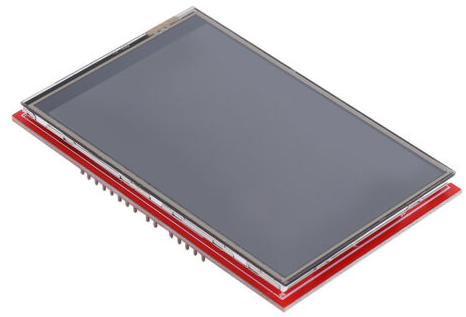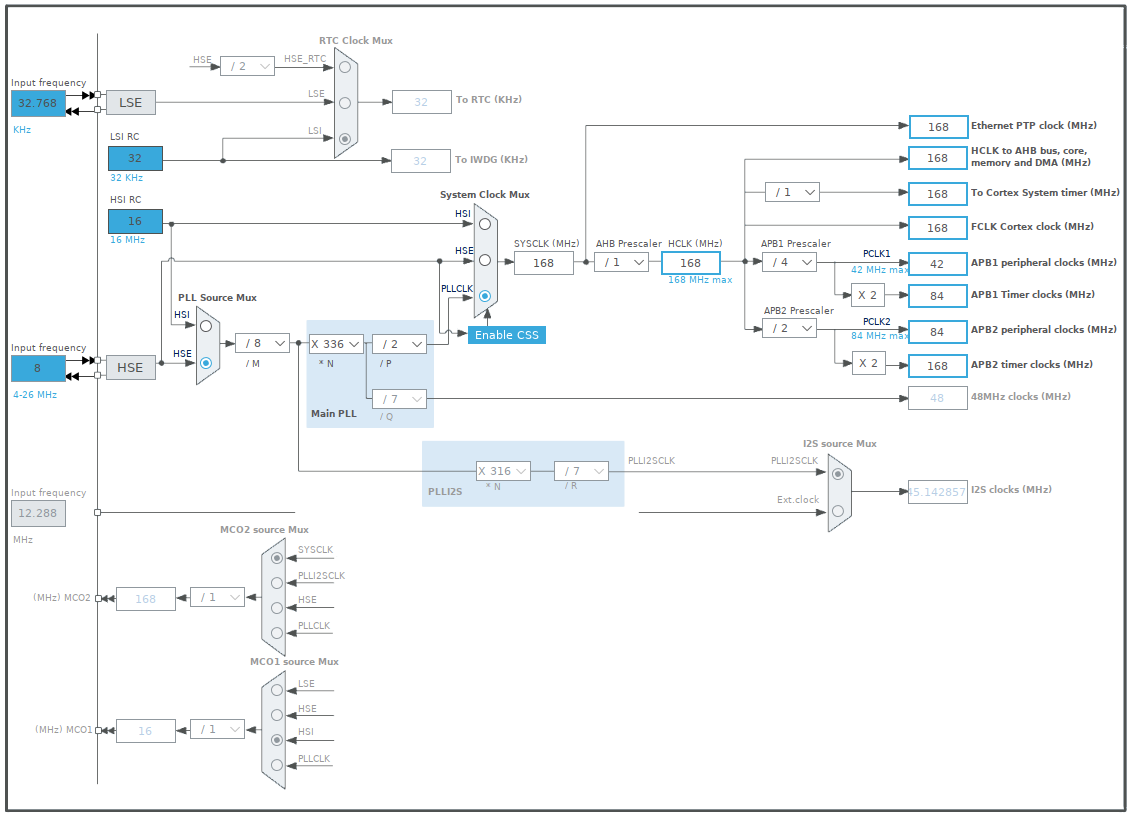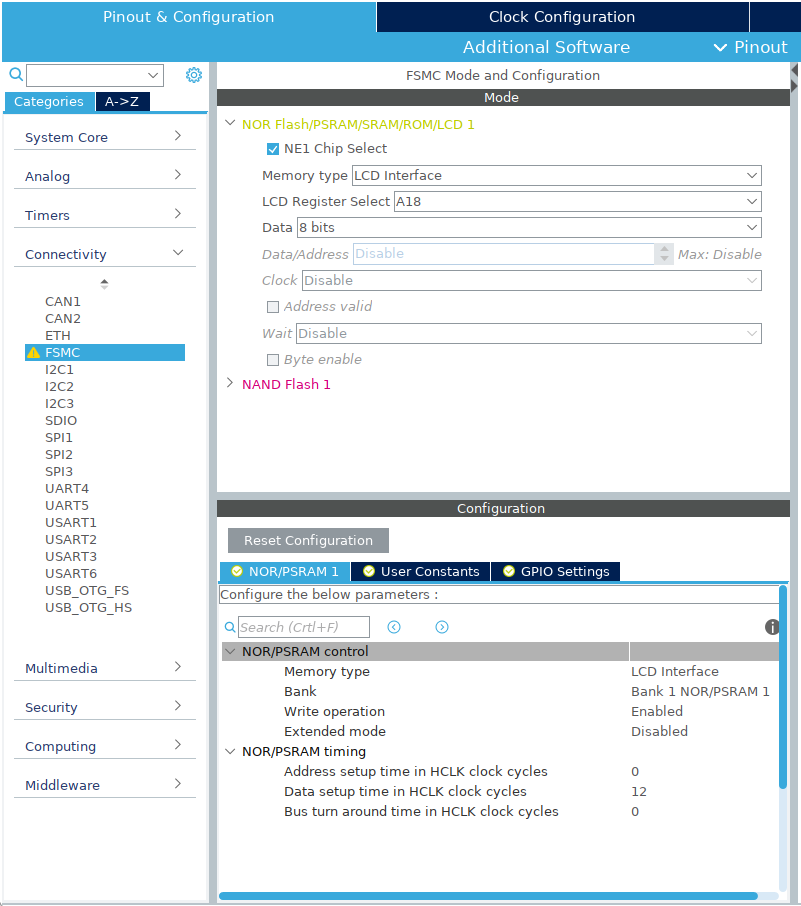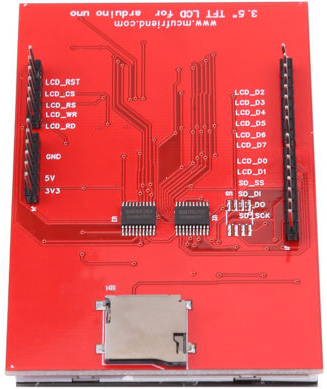3.5" inch TFT LCD Display Module 480X320 driven with FSMC.
TFT LCD Display Module 480X320 driven with FSMC
I have recently bought a 3.5" inch TFT LCD Touch Screen Display Module 480X320 with a www.mcufriend.com label on the back side. The display was equipped with an 8bit parallel interface. First I decided to test it with the UniGraphic library using the BUS_8 protocol. The display was very slow but improved when I switched to the PAR_8 protocol. Because I heard about the possibility to use a Flexible Static Memory Controller (FSMC), built into some STM MCU's, to drive LCD's (read/write to LCD's memory rather than to an external SRAM) I thought it would be a fun to try it out.

Below is the brief story of what I did:
- Created a project for my STM32F407VE board in the STM32CubeIDE
- Set the
Clock Configurationto match the one used by Mbed for the Seeed Arch Max board:
- Selected
FSMCin theConnectivitycategory and configured it as below:
- Let the
STM32CubeIDEgenerate the code (files). - Created a new program for the Seeed Arch Max target in the Mbed Online Compiler by selecting a
mbed os blinkytemplate. - Replaced the
main.cppwith themain.ccontent of theSTM32CubeIDEproject. Copy & Pastedthe other files with codes from theSTM32CubeIDEproject to the online compiler project.- Renamed and modified:
"stm32f4xx_it.h" to "stm32f4xx_it_msp.h"
"stm32f4xx_it.c" to "stm32f4xx_it_msp.c" - Added the UniGraphic library to the online compiler project.
- Extended the
UniGraphiclibrary with aFSMC_8protocol and replaced theTFT::set_orientation(int orient)function with the one used bymcufriendfor arduino. - Modified the
main.cppas needed.
 |  |
Wiring
| STM32F407VE | TFT LCD module |
|---|---|
| +3.3V | 3V3 |
| GND | GND |
| PB_12 | LCD_RST |
| GND | LCD_CS |
| PD_13 (RS) | LCD_RS |
| PD_5 (WR) | LCD_WR |
| PD_4 (RD) | LCD_RD |
| PD_14 (DB00) | LCD_D0 |
| PD_15 (DB01) | LCD_D1 |
| PD_0 (DB02) | LCD_D2 |
| PD_1 (DB03) | LCD_D3 |
| PE_7 (DB04) | LCD_D4 |
| PE_8 (DB05) | LCD_D5 |
| PE_9 (DB06) | LCD_D6 |
| PE_10 (DB07) | LCD_D7 |
Results
| Execution times | ||
|---|---|---|
| Used protocol | BUS_8 | FSMC_8 |
| Operation \ Time | ms | ms |
| Clear | 2283.980 | 38.454 |
| Plot | 192.066 | 11.365 |
| 8bit BMP | 63.805 | 41.338 |
| Large Font | 163.872 | 7.895 |
| Sparce pixels | 2072.265/1458.051 | 74.107/52.168 |
| 16bit BMP | 2288.589 | 59.904 |
main.cpp
- Committer:
- hudakz
- Date:
- 2020-09-25
- Revision:
- 1:47c996032a9e
- Parent:
- 0:fa952828e34c
File content as of revision 1:47c996032a9e:
/* USER CODE BEGIN Header */
/**
******************************************************************************
* @file : main.c
* @brief : Main program body
******************************************************************************
* @attention
*
* <h2><center>© Copyright (c) 2020 STMicroelectronics.
* All rights reserved.</center></h2>
*
* This software component is licensed by ST under BSD 3-Clause license,
* the "License"; You may not use this file except in compliance with the
* License. You may obtain a copy of the License at:
* opensource.org/licenses/BSD-3-Clause
*
******************************************************************************
*/
/* USER CODE END Header */
/* Includes ------------------------------------------------------------------*/
#include "main.h"
/* Private includes ----------------------------------------------------------*/
/* USER CODE BEGIN Includes */
#ifdef __MBED__
#include "mbed.h"
#include "string"
#include "Arial12x12.h"
#include "Arial24x23.h"
/* include "Terminal6x8.h" */
#include "Arial43x48_digits.h"
#include "pict.h"
#include "pavement_48x34.h"
#include "TFT_MIPI.h"
#endif
/* USER CODE END Includes */
/* Private typedef -----------------------------------------------------------*/
/* USER CODE BEGIN PTD */
/* USER CODE END PTD */
/* Private define ------------------------------------------------------------*/
/* USER CODE BEGIN PD */
TFT_MIPI * myLCD;
Timer tmr;
int time1;
int time2;
unsigned short backgroundcolor = Black;
unsigned short foregroundcolor = White;
char orient = 0;
/* USER CODE END PD */
/* Private macro -------------------------------------------------------------*/
/* USER CODE BEGIN PM */
/* USER CODE END PM */
/* Private variables ---------------------------------------------------------*/
//I2S_HandleTypeDef hi2s3;
//PCD_HandleTypeDef hpcd_USB_OTG_FS;
SRAM_HandleTypeDef hsram1;
/* USER CODE BEGIN PV */
/* USER CODE END PV */
/* Private function prototypes -----------------------------------------------*/
static void SystemClock_Config(void);
static void MX_GPIO_Init(void);
static void MX_FSMC_Init(void);
//static void MX_I2S3_Init(void);
//static void MX_USB_OTG_FS_PCD_Init(void);
/* USER CODE BEGIN PFP */
/* USER CODE END PFP */
/* Private user code ---------------------------------------------------------*/
/* USER CODE BEGIN 0 */
uint16_t RGB(uint16_t r, uint16_t g, uint16_t b)
{
return(r * 65536) + (g * 256) + b;
}
/* USER CODE END 0 */
/**
* @brief The application entry point.
* @retval int
*/
int main(void)
{
/* USER CODE BEGIN 1 */
/* USER CODE END 1 */
/* MCU Configuration--------------------------------------------------------*/
/* Reset of all peripherals, Initializes the Flash interface and the Systick. */
// HAL_Init();
/* USER CODE BEGIN Init */
/* USER CODE END Init */
/* Configure the system clock */
// SystemClock_Config();
/* USER CODE BEGIN SysInit */
/* USER CODE END SysInit */
/* Initialize all configured peripherals */
MX_GPIO_Init();
MX_FSMC_Init();
// MX_I2S3_Init();
// MX_USB_OTG_FS_PCD_Init();
/* USER CODE BEGIN 2 */
// PinName dataPins[] = { PD_14, PD_15, PD_0, PD_1, PE_7, PE_8, PE_9, PE_10 }; // FSMC [D0:D7] -> LCD [D0:D7]
// LCD_RST : PB_12 -> LCD_RST
// FSMC_NE1: PD_7 -> LCD_CS
// FSMC_A18: PD_13 -> LCD_RS
// FSMC_NWE: PD_5 -> LCD_WR
// FSMC_NOE: PD_4 -> LCD_RD
// FSMC_D0 : PD_14 -> LCD_D0
// FSMC_D1 : PD_15 -> LCD_D1
// FSMC_D2 : PD_0 -> LCD_D2
// FSMC_D3 : PD_1 -> LCD_D3
// FSMC_D4 : PE_7 -> LCD_D4
// FSMC_D5 : PE_8 -> LCD_D5
// FSMC_D6 : PE_9 -> LCD_D6
// FSMC_D7 : PE_10 -> LCD_D7
//TFT_MIPI myLCD(BUS_8, buspins, PD_7, PB_12, PD_13, PD_5, PD_4, "myLCD", 320, 480); // CS, reset, DC, WR, RD
// CS , RST, DC, WR, RD
myLCD = new TFT_MIPI(FSMC_8, PB_12, "myLCD", 320, 480); // Protocol, Pin->LCD_RST, name , LCDSIZE_X = 320, LCDSIZE_Y = 480
myLCD->set_orientation(orient);
myLCD->background(backgroundcolor); /* set background to black */
myLCD->foreground(foregroundcolor); /* set chars to white */
printf("\n\nSystem Core Clock = %.3f MHZ\r\n", (float)SystemCoreClock / 1000000);
tmr.start();
printf("Target: %s\n", MBED_STRINGIFY(TARGET_NAME));
/* USER CODE END 2 */
/* Infinite loop */
/* USER CODE BEGIN WHILE */
while (1) {
myLCD->set_orientation((++orient) % 4);
//myLCD->set_orientation(1);
/*
* myLCD->set_orientation(2);
*/
myLCD->cls(); /* clear the screen */
myLCD->locate(0, 30);
myLCD->printf("Display ID: %.8X\r\n", myLCD->tftID);
printf("Display ID: %.8X\r\n", myLCD->tftID);
/* mem write/read test */
unsigned short readback;
unsigned short colorstep = (0x10000 / myLCD->width());
for (unsigned short i = 0; i < myLCD->width(); i++) {
myLCD->pixel(i, 0, i * colorstep); /* write line */
}
bool readerror = false;
for (unsigned short i = 0; i < myLCD->width(); i++) {
/* verify line */
readback = myLCD->pixelread(i, 0);
if (readback != i * colorstep) {
readerror = true;
printf("pix %.4X readback %.4X\r\n", i * colorstep, readback);
}
}
myLCD->locate(0, 10);
myLCD->printf("pixelread test %s\r\n", readerror ? "FAIL" : "PASS");
ThisThread::sleep_for(2000);
myLCD->cls();
//myLCD->set_font((unsigned char*)Arial12x12, 32, 127, false); /* variable width disabled */
myLCD->set_font((unsigned char*)Arial12x12);
myLCD->locate(0, 0);
myLCD->printf("Display Test\r\nSome text just to see if auto carriage return works correctly");
printf("Display Test \r\n");
ThisThread::sleep_for(2000);
tmr.reset();
myLCD->cls();
time1 = tmr.read_us();
myLCD->locate(2, 55);
myLCD->printf("cls: %.3fms", (float)time1 / 1000);
printf("cls: %.3fms\r\n", (float)time1 / 1000);
ThisThread::sleep_for(2000);
myLCD->cls();
tmr.reset();
//draw some graphics ;
myLCD->set_font((unsigned char*)Arial24x23);
myLCD->locate(10, 10);
myLCD->printf("Test");
myLCD->line(0, 0, myLCD->width() - 1, 0, foregroundcolor);
myLCD->line(0, 0, 0, myLCD->height() - 1, foregroundcolor);
myLCD->line(0, 0, myLCD->width() - 1, myLCD->height() - 1, foregroundcolor);
myLCD->rect(10, 30, 50, 40, foregroundcolor);
myLCD->fillrect(60, 30, 100, 40, foregroundcolor);
myLCD->circle(150, 32, 30, foregroundcolor);
myLCD->fillcircle(140, 20, 10, foregroundcolor);
double s;
for (unsigned short i = 0; i < myLCD->width(); i++) {
s = 10 * sin((long double)i / 10);
myLCD->pixel(i, 40 + (int)s, foregroundcolor);
}
time1 = tmr.read_us();
myLCD->locate(2, 55);
myLCD->set_font((unsigned char*)Arial12x12);
myLCD->printf("plot: %.3fms", (float)time1 / 1000);
printf("plot: %.3fms\r\n", (float)time1 / 1000);
ThisThread::sleep_for(2000);
myLCD->cls();
tmr.reset();
Bitmap_s pic = { 64, // XSize
64, // YSize
8, // Bytes in Line
burp // Pointer to picture data
};
myLCD->Bitmap_BW(pic, myLCD->width() - 64, 0);
time1 = tmr.read_us();
myLCD->locate(2, 55);
myLCD->printf("bmp: %.3fms", (float)time1 / 1000);
printf("bmp: %.3fms\r\n", (float)time1 / 1000);
ThisThread::sleep_for(2000);
myLCD->cls();
myLCD->set_font((unsigned char*)Arial43x48_digits, 46, 58, false); /* only numbers, variable-width disabled */
tmr.reset();
myLCD->locate(0, 0);
myLCD->printf("%d", 12345);
time1 = tmr.read_us();
myLCD->locate(2, 55);
myLCD->set_font((unsigned char*)Arial12x12);
myLCD->printf("Big Font: %.3fms", (float)time1 / 1000);
printf("Big Font: %.3fms\r\n", (float)time1 / 1000);
ThisThread::sleep_for(2000);
/* sparse pixels test */
myLCD->cls();
myLCD->FastWindow(false);
tmr.reset();
for (unsigned int i = 0; i < 20000; i++) {
myLCD->pixel((i + (i * 89)) % myLCD->width(), (i + (i * 61)) % myLCD->height(), White);
}
myLCD->copy_to_lcd();
time1 = tmr.read_us();
ThisThread::sleep_for(2000);
myLCD->cls();
myLCD->FastWindow(true);
tmr.reset();
for (unsigned int i = 0; i < 20000; i++) {
myLCD->pixel((i + (i * 89)) % myLCD->width(), (i + (i * 61)) % myLCD->height(), White);
}
myLCD->copy_to_lcd();
time2 = tmr.read_us();
myLCD->cls();
myLCD->locate(2, 55);
myLCD->printf("std:%.3fms fastw:%.3fms", (float)time1 / 1000, (float)time2 / 1000);
printf("std: %.3fms fastw: %.3fms\r\n", (float)time1 / 1000, (float)time2 / 1000);
ThisThread::sleep_for(2000);
/* scroll test, only for TFT */
myLCD->cls();
myLCD->set_font((unsigned char*)Arial24x23);
myLCD->locate(2, 10);
myLCD->printf("Scrolling");
myLCD->rect(0, 0, myLCD->width() - 1, myLCD->height() - 1, White);
myLCD->rect(1, 1, myLCD->width() - 2, myLCD->height() - 2, Blue);
myLCD->setscrollarea(0, myLCD->sizeY());
ThisThread::sleep_for(1000);
myLCD->scroll(1); /* up 1 */
ThisThread::sleep_for(1000);
myLCD->scroll(0); /* center */
ThisThread::sleep_for(1000);
myLCD->scroll(myLCD->sizeY() - 1); /* down 1 */
ThisThread::sleep_for(1000);
myLCD->scroll(myLCD->sizeY()); /* same as 0, center */
ThisThread::sleep_for(1000);
myLCD->scroll(myLCD->sizeY() >> 1); /* half screen */
ThisThread::sleep_for(1000);
myLCD->scrollreset(); /* center */
ThisThread::sleep_for(1000);
for (unsigned short i = 1; i <= myLCD->sizeY(); i++) {
myLCD->scroll(i);
ThisThread::sleep_for(2);
}
ThisThread::sleep_for(2000);
/* color inversion */
for (unsigned short i = 0; i <= 8; i++) {
myLCD->invert(i & 1);
ThisThread::sleep_for(200);
}
ThisThread::sleep_for(2000);
/* bmp 16bit test */
myLCD->cls();
tmr.reset();
for (int y = 0; y < myLCD->height(); y += 34) {
for (int x = 0; x < myLCD->width(); x += 48)
myLCD->Bitmap(x, y, 48, 34, (unsigned char*)pavement_48x34);
}
time1 = tmr.read_us();
myLCD->locate(2, 55);
myLCD->set_font((unsigned char*)Arial12x12);
myLCD->printf("Bmp speed: %.3fms", (float)time1 / 1000);
printf("Bmp speed: %.3fms\r\n", (float)time1 / 1000);
ThisThread::sleep_for(2000);
for (int i = 0; i < 3000; i++) {
int x1 = rand() % myLCD->width();
int y1 = rand() % myLCD->height();
int x2 = rand() % myLCD->width();
int y2 = rand() % myLCD->height();
int r = rand() % 0xff;
int g = rand() % 0xff;
int b = rand() % 0xff;
myLCD->line(x1, y1, x2, y2, RGB(r, g, b));
}
for (int i = 0; i < 3000; i++) {
int x1 = rand() % myLCD->width();
int y1 = rand() % myLCD->height();
int r = rand() % 0xff;
int g = rand() % 0xff;
int b = rand() % 0xff;
myLCD->locate(x1, y1);
myLCD->foreground(RGB(r, g, b));
myLCD->printf("Hello World");
}
for (unsigned int i = 0; i < 200000; i++) {
int x1 = rand() % myLCD->width();
int y1 = rand() % myLCD->height();
int r = rand() % 0xff;
int g = rand() % 0xff;
int b = rand() % 0xff;
myLCD->pixel(x1, y1, RGB(r, g, b));
}
for (int i = 0; i < 1000; i++) {
int x1 = rand() % myLCD->width();
int y1 = rand() % myLCD->height();
int x2 = rand() % myLCD->width();
int y2 = rand() % myLCD->height();
int r = rand() % 0xff;
int g = rand() % 0xff;
int b = rand() % 0xff;
//myLCD->rect(x1, y1, x2, y2, RGB(r, g, b));
myLCD->fillrect(x1, y1, x2, y2, RGB(r, g, b));
}
// for (int i = 0; i < 1500; i++) {
// int x1 = rand() % myLCD->width();
// int y1 = rand() % myLCD->height();
// int rad = rand() % myLCD->height() / 2;
// int r = rand() % 0xff;
// int g = rand() % 0xff;
// int b = rand() % 0xff;
// myLCD->circle(x1, y1, rad, RGB(r, g, b));
// myLCD->fillcircle(x1, y1, rad, RGB(r, g, b));
// }
/* USER CODE END WHILE */
/* USER CODE BEGIN 3 */
}
/* USER CODE END 3 */
}
/**
* @brief System Clock Configuration
* @retval None
*/
void SystemClock_Config(void)
{
RCC_OscInitTypeDef RCC_OscInitStruct = { 0 };
RCC_ClkInitTypeDef RCC_ClkInitStruct = { 0 };
RCC_PeriphCLKInitTypeDef PeriphClkInitStruct = { 0 };
/** Configure the main internal regulator output voltage
*/
__HAL_RCC_PWR_CLK_ENABLE();
__HAL_PWR_VOLTAGESCALING_CONFIG(PWR_REGULATOR_VOLTAGE_SCALE1);
/** Initializes the CPU, AHB and APB busses clocks
*/
RCC_OscInitStruct.OscillatorType = RCC_OSCILLATORTYPE_HSE;
RCC_OscInitStruct.HSEState = RCC_HSE_ON;
RCC_OscInitStruct.PLL.PLLState = RCC_PLL_ON;
RCC_OscInitStruct.PLL.PLLSource = RCC_PLLSOURCE_HSE;
RCC_OscInitStruct.PLL.PLLM = 8;
RCC_OscInitStruct.PLL.PLLN = 336;
RCC_OscInitStruct.PLL.PLLP = RCC_PLLP_DIV2;
RCC_OscInitStruct.PLL.PLLQ = 7;
if (HAL_RCC_OscConfig(&RCC_OscInitStruct) != HAL_OK) {
Error_Handler();
}
/** Initializes the CPU, AHB and APB busses clocks
*/
RCC_ClkInitStruct.ClockType = RCC_CLOCKTYPE_HCLK | RCC_CLOCKTYPE_SYSCLK | RCC_CLOCKTYPE_PCLK1 | RCC_CLOCKTYPE_PCLK2;
RCC_ClkInitStruct.SYSCLKSource = RCC_SYSCLKSOURCE_PLLCLK;
RCC_ClkInitStruct.AHBCLKDivider = RCC_SYSCLK_DIV1;
RCC_ClkInitStruct.APB1CLKDivider = RCC_HCLK_DIV4;
RCC_ClkInitStruct.APB2CLKDivider = RCC_HCLK_DIV2;
if (HAL_RCC_ClockConfig(&RCC_ClkInitStruct, FLASH_LATENCY_5) != HAL_OK) {
Error_Handler();
}
// PeriphClkInitStruct.PeriphClockSelection = RCC_PERIPHCLK_I2S;
// PeriphClkInitStruct.PLLI2S.PLLI2SN = 316;
// PeriphClkInitStruct.PLLI2S.PLLI2SR = 7;
if (HAL_RCCEx_PeriphCLKConfig(&PeriphClkInitStruct) != HAL_OK) {
Error_Handler();
}
}
/**
* @brief I2S3 Initialization Function
* @param None
* @retval None
*/
//static void MX_I2S3_Init(void)
//{
// /* USER CODE BEGIN I2S3_Init 0 */
// /* USER CODE END I2S3_Init 0 */
// /* USER CODE BEGIN I2S3_Init 1 */
// /* USER CODE END I2S3_Init 1 */
// hi2s3.Instance = SPI3;
// hi2s3.Init.Mode = I2S_MODE_MASTER_TX;
// hi2s3.Init.Standard = I2S_STANDARD_PHILIPS;
// hi2s3.Init.DataFormat = I2S_DATAFORMAT_16B;
// hi2s3.Init.MCLKOutput = I2S_MCLKOUTPUT_ENABLE;
// hi2s3.Init.AudioFreq = I2S_AUDIOFREQ_44K;
// hi2s3.Init.CPOL = I2S_CPOL_LOW;
// hi2s3.Init.ClockSource = I2S_CLOCK_PLL;
// hi2s3.Init.FullDuplexMode = I2S_FULLDUPLEXMODE_DISABLE;
// if (HAL_I2S_Init(&hi2s3) != HAL_OK) {
// Error_Handler();
// }
// /* USER CODE BEGIN I2S3_Init 2 */
// /* USER CODE END I2S3_Init 2 */
//}
/**
* @brief USB_OTG_FS Initialization Function
* @param None
* @retval None
*/
//static void MX_USB_OTG_FS_PCD_Init(void)
//{
// /* USER CODE BEGIN USB_OTG_FS_Init 0 */
// /* USER CODE END USB_OTG_FS_Init 0 */
// /* USER CODE BEGIN USB_OTG_FS_Init 1 */
// /* USER CODE END USB_OTG_FS_Init 1 */
// hpcd_USB_OTG_FS.Instance = USB_OTG_FS;
// hpcd_USB_OTG_FS.Init.dev_endpoints = 4;
// hpcd_USB_OTG_FS.Init.speed = PCD_SPEED_FULL;
// hpcd_USB_OTG_FS.Init.dma_enable = DISABLE;
// hpcd_USB_OTG_FS.Init.phy_itface = PCD_PHY_EMBEDDED;
// hpcd_USB_OTG_FS.Init.Sof_enable = DISABLE;
// hpcd_USB_OTG_FS.Init.low_power_enable = DISABLE;
// hpcd_USB_OTG_FS.Init.lpm_enable = DISABLE;
// hpcd_USB_OTG_FS.Init.vbus_sensing_enable = DISABLE;
// hpcd_USB_OTG_FS.Init.use_dedicated_ep1 = DISABLE;
// if (HAL_PCD_Init(&hpcd_USB_OTG_FS) != HAL_OK) {
// Error_Handler();
// }
// /* USER CODE BEGIN USB_OTG_FS_Init 2 */
// /* USER CODE END USB_OTG_FS_Init 2 */
//}
/**
* @brief GPIO Initialization Function
* @param None
* @retval None
*/
static void MX_GPIO_Init(void)
{
/* GPIO Ports Clock Enable */
__HAL_RCC_GPIOB_CLK_ENABLE();
__HAL_RCC_GPIOC_CLK_ENABLE();
__HAL_RCC_GPIOD_CLK_ENABLE();
__HAL_RCC_GPIOE_CLK_ENABLE();
__HAL_RCC_GPIOH_CLK_ENABLE();
}
/* FSMC initialization function */
static void MX_FSMC_Init(void)
{
/* USER CODE BEGIN FSMC_Init 0 */
/* USER CODE END FSMC_Init 0 */
FSMC_NORSRAM_TimingTypeDef Timing = { 0 };
/* USER CODE BEGIN FSMC_Init 1 */
/* USER CODE END FSMC_Init 1 */
/** Perform the SRAM1 memory initialization sequence
*/
hsram1.Instance = FSMC_NORSRAM_DEVICE;
hsram1.Extended = FSMC_NORSRAM_EXTENDED_DEVICE;
/* hsram1.Init */
hsram1.Init.NSBank = FSMC_NORSRAM_BANK1;
hsram1.Init.DataAddressMux = FSMC_DATA_ADDRESS_MUX_DISABLE;
hsram1.Init.MemoryType = FSMC_MEMORY_TYPE_SRAM;
hsram1.Init.MemoryDataWidth = FSMC_NORSRAM_MEM_BUS_WIDTH_8;
hsram1.Init.BurstAccessMode = FSMC_BURST_ACCESS_MODE_DISABLE;
hsram1.Init.WaitSignalPolarity = FSMC_WAIT_SIGNAL_POLARITY_LOW;
hsram1.Init.WrapMode = FSMC_WRAP_MODE_DISABLE;
hsram1.Init.WaitSignalActive = FSMC_WAIT_TIMING_BEFORE_WS;
hsram1.Init.WriteOperation = FSMC_WRITE_OPERATION_ENABLE;
hsram1.Init.WaitSignal = FSMC_WAIT_SIGNAL_DISABLE;
hsram1.Init.ExtendedMode = FSMC_EXTENDED_MODE_DISABLE;
hsram1.Init.AsynchronousWait = FSMC_ASYNCHRONOUS_WAIT_DISABLE;
hsram1.Init.WriteBurst = FSMC_WRITE_BURST_DISABLE;
hsram1.Init.PageSize = FSMC_PAGE_SIZE_NONE;
/* Timing */
Timing.AddressSetupTime = 0;
Timing.AddressHoldTime = 0;
Timing.DataSetupTime = 12;
Timing.BusTurnAroundDuration = 0;
Timing.CLKDivision = 16;
Timing.DataLatency = 17;
Timing.AccessMode = FSMC_ACCESS_MODE_A;
/* ExtTiming */
if (HAL_SRAM_Init(&hsram1, &Timing, NULL) != HAL_OK) {
Error_Handler();
}
/* USER CODE BEGIN FSMC_Init 2 */
/* USER CODE END FSMC_Init 2 */
}
/* USER CODE BEGIN 4 */
/* USER CODE END 4 */
/**
* @brief This function is executed in case of error occurrence.
* @retval None
*/
void Error_Handler(void)
{
/* USER CODE BEGIN Error_Handler_Debug */
printf("Error_Handler called\r\n");
while (true) { }
/* User can add his own implementation to report the HAL error return state */
/* USER CODE END Error_Handler_Debug */
}
#ifdef USE_FULL_ASSERT
/**
* @brief Reports the name of the source file and the source line number
* where the assert_param error has occurred.
* @param file: pointer to the source file name
* @param line: assert_param error line source number
* @retval None
*/
void assert_failed(uint8_t* file, uint32_t line)
{
/* USER CODE BEGIN 6 */
/* User can add his own implementation to report the file name and line number,
tex: printf("Wrong parameters value: file %s on line %d\r\n", file, line) */
/* USER CODE END 6 */
}
#endif /* USE_FULL_ASSERT */
/************************ (C) COPYRIGHT STMicroelectronics *****END OF FILE****/